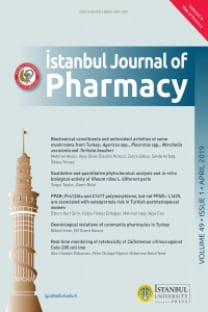Ethics in pharmacy education: a research on pharmacy students’ ethical awareness and views
DOI: 10.26650/IstanbulJPharm.2019.19011This study was conducted to determine the ethical awareness of pharmacy students. Additionally, it intends to find the similarities and differences between ethical orientations of the pharmacy students having done the course “Pharmacy Deontology” or not. Moreover, the views and evaluations of the students who have completed the course are determined. Two hundred pharmacy students from Istanbul University Faculty of Pharmacy participated in the research. The research data was collected through questionnaires prepared by the researchers based on Deontology Charter by the Turkish Pharmacists’ Association and the Pharmacies and Pharmacists Law no. 6197 and analyzed via t-test. The general results reflect a great deal of ethical awareness except the issues such as, providing prescription medicine and non-medical health products, promotional activities and use of advertisements. Moreover, there is a statistical significant difference between the two groups’ of ethical orientations (participants having completed the course or not). As an overall evaluation, the pharmacy deontology course seems to add value for pharmacicst candidates to make ethical decisions. Cite this article as: Alaca L, Aydınlı Kulak F (2019). Ethics in pharmacy education: a research on pharmacy students’ ethical awareness and views. Istanbul J Pharm 49 (2): 70-76.
___
- Arda B, Şahinoğlu PS (1995). Tıbbi etik: Tanımı, içeriği, yöntemi ve başlıca konuları. Ankara Tıp Mecmuası 3(48): 323-336. Asil E (1991). Eczacılıkta Karşılaşılan Etik Sorunlar. Eczacı Odası Yayınları, Meslek içi Eğitim Programı MİEP. Aydın M (2017). İş/Meslek ahlâkı ve ahlak teorileri. In: Meslek etiği. Ondokuz Mayıs Üniversitesi Uzakta Eğitim Merkezi Yayınları: 8- 9. Beauchamp, TL, Childress, JF (1979) Principles of biomedical ethics. New York: Oxford University Press. Beauchamp, TL, Childress, JF (2001) Principles of biomedical ethics. New York: Oxford University Press. Bezci B (2005). Kant ve Hegel’in Felsefesinde Etik Anlayışı. SÜ İİBF Sosyal ve Ekonomik Araştırmalar Dergisi, 9: 49-61. Buckley, MR, Danielle SB, Dwight DF, Howard JL, Howard B, Mobbs TA, Ferris GR (2001). Ethical issues in human resources systems. Human Resource Management Review 11: 11-29. Greenwood, M.R. (2002). Ethics and HRM: A review and conceptual analysis. Journal of Business Ethics 36(3): 261-278. Özçelikay G, Şar S, Özcömert GH, Asil E (1996). Eczacılık hizmetleri ve etik. Türkiye Klinikleri Tıbbi Etik Dergisi 2(4):52-54. Kuçuradi I (1993). Sağlık bilimlerinde ve uygulamalarında etik sorunlar. Toplum ve Hekim Dergisi, 57(8): 26-29. Öztürk O (2006). Ahlak Olgusunun Kaynağı Nedir? Köprü Dergisi 95 http://www.koprudergisi.com/index.asp?Bolum=EskiSayilar&Goster=Yazi&YaziNo=793 Rose A (2008). Ethics and human resource management. In Exploring Human Resource Management, Porter C, Bingham C, Simmonds D, Mc Graw-Hill Higher Education, London. Weinstein BD (1993) Ethical decision making in pharmacy. American Pharmacy, 9(33): 48-50. Winstaley D, Woodall J (2000). The adolescence of ethics in human resource management. Human Resource Management Journal 10(4): 45-48. Yıldırım G, Kadıoğlu S (2007). Etik ve temel kavramlar. C.Ü. Tıp Fakültesi Dergisi 29: 7-12. Deontology Charter by Turkish Pharmacists’ Association. http://www.ttb.org.tr/mevzuat/index.php?option=com_content&view=article&id=52:tibbdeontolojt&catid=4:t&Itemid=31 Pharmacies and Pharmacists Law no. 6197. http://www.mevzuat.gov.tr/MevzuatMetin/1.3.6197.pdf
- ISSN: 2548-0731
- Yayın Aralığı: Yılda 3 Sayı
- Başlangıç: 1965
- Yayıncı: İstanbul Üniversitesi
Sayıdaki Diğer Makaleler
Leyla ALACA, Fulya AYDINLI KULAK
Serap İLİKAY, Ender COŞKUNPINAR, Özlem KURNAZ-GÖMLEKSİZ, Zehra BUĞRA, Allison P. ERONAT, Oğuz ÖZTÜRK, Hülya YILMAZ-AYDOĞAN
Serpil UGRAŞ, Sultan ÜLGER, Pınar GÖÇ RASGELE
Çağla Begüm APAYDIN, Zafer CESUR
Neriman ÖZHATAY, Şükran KÜLTÜR, Bahar GÜRDAL
Abdullahi Rabiu ABUBAKAR, Mainul HAQUE
Merve KURTAN YÜKSEL, Dilek ÖZTÜRK, Ezgi ÖZTAŞ, Gül ÖZHAN, Aylin ALTANLAR TÜRKER, Taner KORKMAZ, Alper OKYAR, Zeliha PALA KARA
